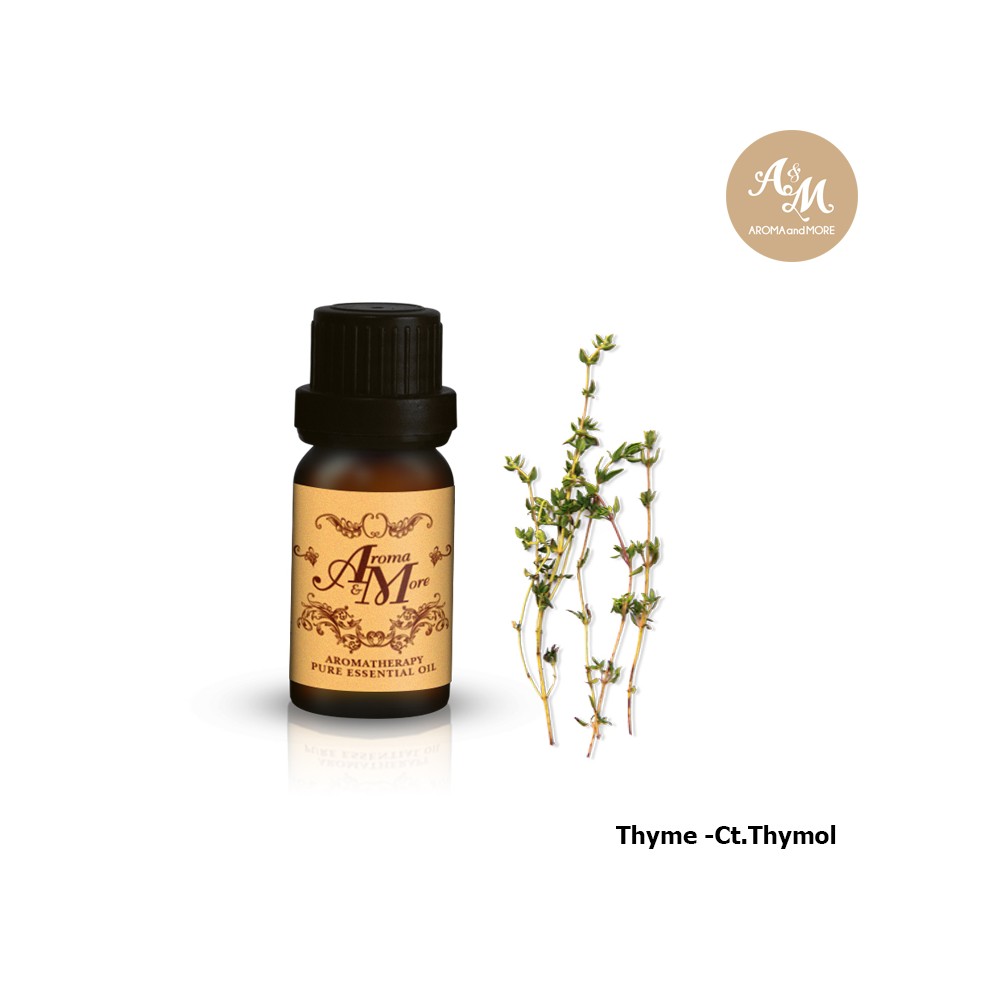








Thyme (Thymol ct.) 100% Pure Essential Oil, Germany
Botanical Name: Thymus vulgaris
Origin: Germany
Method of Extraction: Steam Distilled
Parts used: Leaf/Herb
Color: Golden Yellow
Perfumery Note: Top
Consistency: Thin
Aromatic Description: Warm, Herbaceous, Woody, Spicy, Peppery
Blends well with: Balsam Peru, Bay, Bergamot, Black Pepper, Cajeput, Cinnamon Bark, Clary Sage, Eucalyptus, Eucalyptus Lemon, Fir, Grapefruit, Helichrysum, Hinoki, Immortelle, Juniper Berry, Lavandin, Lavender Spike, Lavender, Lemon, Lemongrass, Lime, Manuka, Marjoram, Oregano, Pine, Rosemary, Sage, Tea Tree, Vetiver
Initial Strength: Medium/Strong
Class: Phenol
Red Thyme is the common name for all Thyme of the Thymus vulgaris species but it is most often used to refer to the Thymol chemotype. Except for the Linalool chemotype, thyme essential oils have from 18% to 62% Thymol and share similar minor constituents at different concentrations so the chemotypes share some of the same basic benefits. White Thyme is simply Red Thyme that has been rectified by redistilling or vacuum redistilled to remove some phenols and produce a clear to light colored oil.
It is believed that, when Thyme grows at lower elevations it absorbs more infrared light producing a sharper Thymol chemotype. When grown at high altitude thyme absorbs more blue/ultraviolet light producing a milder linalool type essential oil, much like Lavender.
Thymol is one of the best chemotypes for supporting the immune system, disinfection, improving circulation and reducing the severity respiratory issues. It is used traditionally as an antiseptic, antiparasitic and insect repellent. Thymol is used in name brand mouthwashes and toothpastes. It fights plaque and gingivitis and thought to add a protective coating to teeth.
Thymol shows promise in reducing a bacteria’s ability to develop resistance to antibiotics. Diffused in the air it may partner well with antibiotics.
Some common chemotypes of this species include;
ct. Thymol – 47% to 62% Thymol
ct. Linalool – 72% to 79% Linalool
ct. Thujanol – approximately 47% Thujanol
ct. Geraniol – approximately 25% Geraniol
ct. Carvacrol – approximately 42% Carvacrol
ct. Limonene – approximately 24% Limonene (and appx. 27% Thymol)
ct. P-cymene – 25% to 45% P-cymene, precursor to formation of thymol or carvacrol
General uses for Thyme:
1) Diffused in the air Thyme is thought to reduce the severity of respiratory issues.
2) Thyme balances the hormone system
3) It is antiseptic, antibacterial and antifungal
4) It partners well in hair formulas, particularly in hair loss formulations
5) Thyme repels some types of mosquitos, fleas, lice, bed bugs, moths and beetles. It is an effective home fumigant.
6) It is a calming oil which eases the severity of stress and anxiety and may improve sleeping
7) It is frequently use for tooth health to fight gingivitis, plaque, bad breath and coat and protect teeth.
8) Thyme supports the immune system
Our store is available for customers to test the aroma of any essential oils that we carry before making a purchase. Just search aroma and more in Thailand on any map application.
*High concentrations of thymol in thyme may crystalize. This is a normal property of the oil and it can usually be returned to liquid by gently warming the bottle in warm water.
Note: Multiple cautions for oral use. Most essential oils cannot be taken internally, but even when they can, essential oils are highly concentrated and require dilution, special training and caution that Aroma & More does not yet provide. You can never drink any essential oils at 100% strength or diluted in water-based liquids.
Caution: Thymol type may have drug interaction considerations. It may prevent blood from clotting. There is a low risk of skin sensitivity. Suggested to dilute this type to less than 1.3% if used on the skin. Essential oils can be harmful if used improperly. Information is provided for educational purposes only. It is up to the customer to determine if the product is right for their intended purpose. Special consideration should be made before applying essential oils to pregnant women, children or the elderly. If under a doctor's care, please consult the physician before using essential oils. If applying to skin essential oils must be diluted correctly and Aroma & More recommends testing on a small area of skin to check for reaction before attempting a full body massage. Claims have not been evaluated by the FDA.
No comment at this time.
You Must Login To ReviewYou might also like